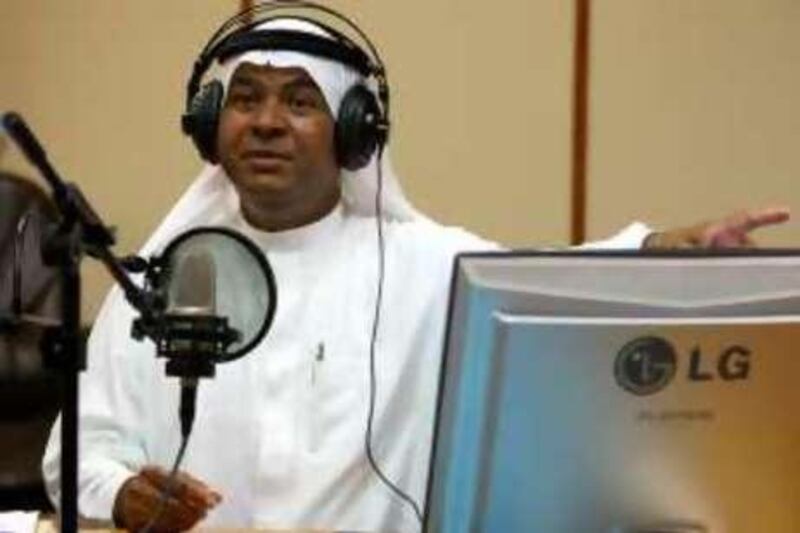SHARJAH // With oil revenues at record levels, people across the country are splashing out on expensive sports cars and SUVs, luxurious villas and even yachts. Many of them are also falling deep into debt and a growing number are being caught in dubious get-rich-quick schemes.
Salah al Halyan, the good-natured host of a popular weekly financial planning programme on Radio Sharjah, has a warning for them that he admits could ruffle a few feathers: the UAE has become too comfortable, even complacent, with its wealth. "We in the Gulf countries now live in welfare societies - we are given salaries and are comfortable," he says. "And people think they are privileged - they think they are special. And that's a very serious problem because they are complacent and you have to wake them up and make them understand that the world is not like that."
According to Mr Halyan, some people are starting to listen. Every week, dozens of people call or text his programme and a surprising number, he says, are genuinely receptive to his message that they need to manage their money more conservatively and become proactive about their finances. He is not the only one aware of the problem. The Federal National Council recently called on the Government to impose stricter regulations on borrowing in order to stave off what some analysts warn is an impending consumer-debt crisis. In April, an FNC report said the level of consumer debt had increased to Dh43 billion (US$16bn) at the end of 2007, compared with Dh28bn the previous year.
Some members said it was too easy for people to get credit cards with high spending limits which, coupled with a lack of a credit reporting system, was a recipe for disaster. The number of people arrested for failing to pay their debts has increased considerably in recent years, according to the FNC report. About 10,000 people were either before the courts or in prison for failing to repay loans and credit card balances. Some estimates suggest that 41 per cent of inmates in Dubai's prisons are there for debt-related crimes.
Mr Halyan believes one answer to the problem is education. During his 90-minute programme, Your Financial Consultant, which airs in Arabic every Friday at 8pm, he fields the most basic of questions: What is the difference between a stock and a bond? Am I too old to start saving? How do I know if I'm being cheated by an investment scam? Many people in the Emirates have no access to such information, he says, rendering them vulnerable to mounting debts and making them easy prey for con artists.
"People lack this kind of information where they can educate themselves on the basics of personal finance. I get so many positive responses like, 'Oh, now I know the difference between shares and bonds. I never knew it was like that'." Mr Halyan, who has practised financial planning and personal wealth management in both the US and the UAE for two decades and set up a financial firm called Gulf Insurance Consulting in Dubai eight years ago, likes to keep things simple.
"I think the most important point is that there is somebody who is explaining these concepts to them, and making it clear and in simple language, in a way that is not complicated," he says. "Most of the time, when people use terminology and words which are so complicated and scary, people switch their radio and listen to something else. That's why we use down-to-earth language." He also wants to impart a healthy scepticism about easy money and receives an especially large number of questions from callers concerned about investment fraud.
After an investment con involving postdated cheques dubbed the "case of the non-existent wallet" was smashed by police in April, his programme received dozens of calls from listeners asking whether they were also being conned out of their money. The suspect in the case is alleged to have promised victims returns that ranged from 10 per cent to 30 per cent on their investments. During one of the conversations, Mr Halyan recalled, a caller expressed an interest in another investment that promised unusually high returns, which he found suspicious. "I said, 'What is this, popcorn? You just put it in and it grows like crazy? Money doesn't grow like that'."
Listeners tune in from as far afield as Egypt and Qatar. And they are not just people whose wallets are bulging from the oil boom. They are also mothers who are studying for university degrees or retired workers who are looking for strategies to save a little extra money. Some high-ranking government officials and FNC members have even called in to say they are fans of the programme. "It's about being positive - we don't want negativity," says Mr Halyan.
"There are problems to solve and we don't need people to cry, or to point fingers. "We want to say that you're responsible for your own affairs - not the Government, not your parents, not your husband, not your brothers. "One day, if you don't prepare for being old, you will have no one to blame but yourself." @Email:hnaylor@thenational.ae * Your Financial Consultant airs from 8 to 9.30pm every Friday. It is repeated on Saturdays from 9 to 10.30am on Sharjah Radio (FM 94.4)






